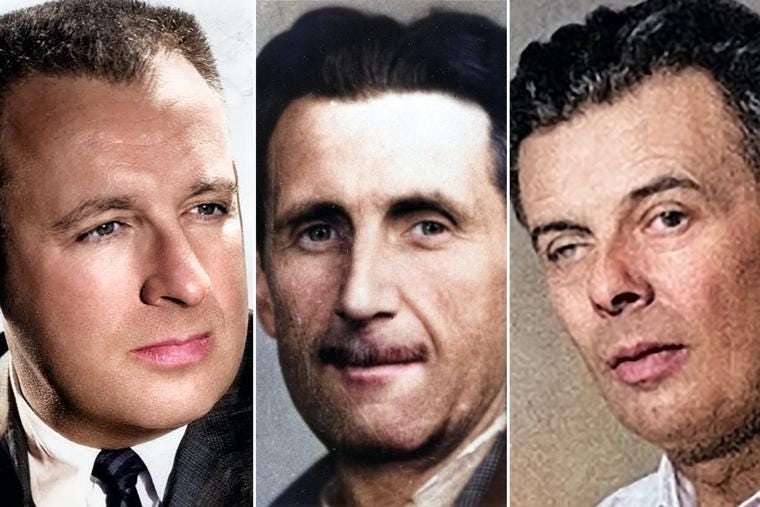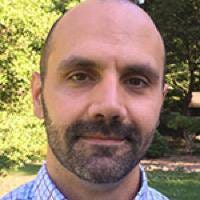A Consideration of the Major Prophets: Bradbury, Orwell and Huxley
As I have returned to these books in my adulthood, I have been shocked by how accurate and insightful these books are.
Ray Bradbury in 1959, George Orwell in 1943 and Aldous Huxley in 1947 (photo: Wikimedia Commons / Public Domain / Colorized by Register Staff)
Matt D’Antuono BlogsOctober 23, 2023
When I originally read Brave New World in high school, I vividly remember thinking that I had been introduced to the meaning of life. What exactly it was, I couldn’t have articulated, but it had something to do with John’s decision to live a life apart from the technological comforts provided in the “brave new world.”
Along with that book, I also remember reading 1984, by George Orwell, and Fahrenheit 451, by Ray Bradbury, also dystopian novels that seemed like ominous warnings about what the world may look like someday. What I later learned is that these authors were not necessarily talking about the future; they were writing about things they were already observing.
As I have returned to these books in my adulthood, I have been shocked by how accurate and insightful these books are. The authors saw in seed form what has now blossomed into concerning realities. The advancement of technology has only enhanced the ability of the powerful to enforce dystopian ideals. Here is a (very) brief look at what each book got right.
1984 by George Orwell
News and information control. Orwell observed government control of the news during the Spanish Civil War and in England during World War II, and now we see it every day all over the world. The big difference is that it is not just the governments controlling information; it is Big Tech. Major corporations control how and what information is available.
Surveillance. In the book, Big Brother has cameras and microphones hidden just about everywhere. Now, there are microphones and cameras in plain sight, and we carry them with us. Our technology has become the tool we use for everything, and it keeps track of everything we do. Once again, it is not necessarily the government running the show, but big businesses.
Language control. One of the government’s major projects is its dictionary and the simplification of language. Language expresses thought, and by eliminating certain words, certain thoughts cannot be expressed. Today, our government has taken on the task of defining words like marriage and the proper use of pronouns.
Brave New World by Aldous Huxley
Sexualization of children. In the book, children are trained in sexual promiscuity from a young age so that, when they grow up, they will not form attachments. The goal is to destroy the family so that the ruling powers can control life from its very beginning to its very end. Families get in the way of a smoothly running society. Today, children are being sexualized through literature and the content they consume on the internet.
Language control. The citizens cannot keep themselves from giggling when they hear words like mother because the family has been destroyed. As in 1984, language control is a theme, but it is accomplished without the force of the government. Today, all it takes is for a video to go viral and a word or someone’s name becomes a trigger for laughter, and no one has to take it seriously.
Dependence on pharmaceuticals. In the book, no one is ever without their soma, the government-issued drug that anyone can take any time they start to feel anything other than happy. So, we too have pills and drugs to take for any occasion and for a wide variety of maladies.
Fahrenheit 451 by Ray Bradbury
Obsession with media. The protagonist’s wife spends most of her time in a room with three walls of screen so that she can be with her “family,” i.e. the characters in the shows she watches. The media is more real for her than the reality she inhabits. We, too, spend so much time and energy in the midst of endless and meaningless entertainment. The one thing Bradbury got wrong is the size of the screen; instead of wall-sized screens, we have millions of tiny screens to bring with us everywhere we go.
The suppression of great literature. Books are burned because books are dangerous. They give people ideas. So, if no one reads great books and thinks about the great ideas like love, justice, freedom, goodness, beauty and truth, then people can be controlled. Give people endless entertainment and take away their books, and they become less like humans and more like lemmings. In our age, the government doesn’t have to do this; we have done it to ourselves with the assistance of technology.
Suppression of the Great Books
The theme of suppression of the great books, including religion and the Bible, runs through all three novels. Perhaps it is THE theme. I take this to be a grave warning, but it is also a ray of hope. These authors are implicitly showing us how to avoid becoming automatons of tyrannical governments and corporations: read the great books.
Why? As Mortimer Adler points out in his introduction to The Great Books of the Western World, the books in that collection were chosen because they discuss the great ideas, the ideas that make us truly human. Along with the Bible, they examine the ideas that give meaning to life and make life worth living. As Socrates said, “The unexamined life is not worth living,” and these three books show us what the unexamined life can look like.
Matt D’Antuono is a physics teacher, a Great Books discussion moderator for the Angelicum Academy, and an associate of the community of the Friars of the Renewal. He lives on a hobby farm in New Jersey with his wife and nine children. He holds bachelor’s degrees in physics and philosophy, a master’s degree in special education, and a master’s degree in philosophy from Holy Apostles in Cromwell, Connecticut. He returned to the Catholic Church in 2008. He is the author of A Fool’s Errand: A Brief, Informal Introduction to Philosophy for Young Catholics, The Wiseguy and the Fool and Philosophy Fridays. On YouTube you can find him at DonecRequiescat and his family at MisterD418. Matt is also a Catholic speaker and a member of the Catholic Speakers Organization (CatholicSpeakers.com)
https://www.ncregister.com/blog/bradbury-orwell-and-huxley
________________________________________________________________________
A NOTE TO BRAZILIAN READERS : Recomendo enfaticamente o livro de PAULO BRIGUET “O mínimo sobre distopias”. Excelente análise, mais profunda, sobre este tema. À venda na Editora PHVox ( https://livrariaphvox.com.br/o-minimo-sobre-distopias) e várias outras livrarias.






